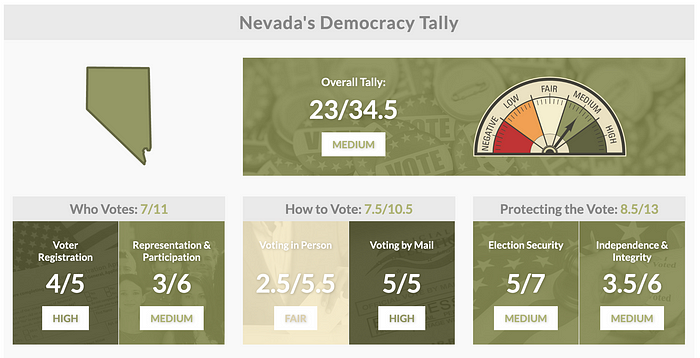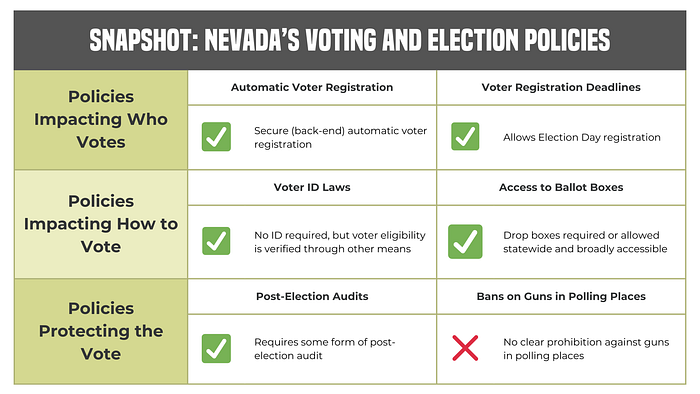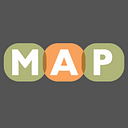Voting and Elections
2024 Election Policies Preview: Nevada

In advance of November’s election, MAP’s new “Election Policies Preview” series details voting and election policies in key states, including policies that impact who votes, policies that impact how to vote, and policies that protect the vote. This week, we are continuing the series with Nevada.
Quick Facts About Nevada
- Democracy Tally — 9th in the U.S. for voting and election policies
- 2020 Voter Registration Rate — 84.21%
- 2020 Presidential Election Voter Turnout Percentage — 65.4%
- 2020 Presidential Election Vote Margins — 33,596 votes (3%)
- 2020 Presidential Election Youth Voter Turnout — 53%
- 2022 Midterms Youth Voter Turnout — 24.5%

Nevada’s Voting and Election Policies
Policies Impacting Who Votes
The Democracy Maps track policies related to voter eligibility and registration under the category of Who Votes. This category includes policies such as automatic and online voter registration, which work to determine the eligible electorate in each state. Who Votes also includes policies related to representation and participation, including rights restoration for formerly incarcerated people and the partisanship of state primary systems.
Automatic Voter Registration
Nevada is one of 24 states that has some form of automatic voter registration. Specifically, Nevada uses back-end, or secure AVR, which allows designated agencies, such as state DMVs, to systematically send information from relevant transactions to state election authorities. Once the voter’s eligibility is confirmed, the voter is then automatically registered (or registered in pending status) before being given an opportunity to opt-out at a later time, usually through the mail. Secure AVR systems are more efficient and effective at registering eligible voters, keeping registration records accurate, and registering only U.S. citizens to vote.
Voter Registration Deadlines
Nevada is one of 22 states and D.C. that allows voters to register and cast their ballot through Election Day. Evidence shows that allowing Election Day registration in particular increases access for voters and boosts turnout. This policy is even more effective in increasing registration rates in the state as it is coupled with Secure AVR.
Policies Impacting How to Vote
The Democracy Maps track policies related to in-person and mail voting methods under the category of How to Vote. This category includes policies like early voting, voter ID requirements, and the availability of absentee or mail voting.
Voter ID Laws
Nevada is one of 14 states and D.C. where voters are not required to present identification at the polls, but voter eligibility is verified through other means. Specifically, in Nevada, voters must state their name and provide their signature in order to verify their identity.
Voters in Nevada this year will weigh in on a ballot measure that would establish a strict photo ID requirement in the state. If passed, Nevada would join 11 states that currently have these unnecessarily strict requirements.
Access to Ballot Boxes
Nevada is one of 30 states where drop boxes are required or allowed to be used statewide and are broadly accessible. Drop boxes are a popular option with voters in Nevada, as the state has recently joined seven other states and D.C. that utilize all-mail elections, where every registered voter is automatically sent a mail ballot.
Policies Protecting the Vote
The Democracy Maps track policies related to the independence, integrity and security of elections under the Protecting the Vote category. This category includes policies related to security like post-election audits, and policies such as laws allowing state legislatures to interfere in election administration that harm the independence and integrity of elections.
Post-Election Audits
Nevada is one of 41 states that require the use of a post-election audit. Properly conducted, nonpartisan audits provide public confidence in election results and can also act as a safeguard against hacking and foreign interference.
Specifically, Nevada requires the use of risk-limiting audits. These best practice audits use statistical methods to analyze random samples of ballots and verify the accuracy of election results. In a risk limiting audit, the size of the random ballot sample is increased until there is statistical and objective confidence in the election results.
Bans on Guns in Polling Places
Nevada is one of 26 states that has no clear prohibition on the possession of firearms in polling places. The 2020 election cycle saw an alarming increase in reports of intimidation against voters and election officials. Guns at polling places, even if not used to commit violence, can be used to intimidate voters and election officials. Combined with the marked rise in threats and violent rhetoric around elections, the proliferation of firearms in our country represents an increasing danger for everyone participating in the voting process.

Much like the other states highlighted in our series, Nevada also had a close margin in the 2020 election, with President Biden winning the state by under 35,000 votes. Similarly, the state had logistical challenges with ballot processing in 2020, in part due to the adoption of all-mail voting for the first time and allowing postmarked ballots to arrive up to four days after Election Day.
These policies have been the focus of repeated litigation and since 2020, the state has experienced a dramatic rise in election denialism. Fitting the pattern seen in other battleground states, there have also been numerous attempts to delay the certification of results and attempts to require hand counts of ballots. Also, in addition to the voter ID ballot measure discussed above, Nevada voters will weigh in on a separate ballot measure that would establish nonpartisan top-five primaries and ranked choice voting in the state going forward. With Nevada again forecasted to be closely contested, these developments are important to monitor in November.
Note: On October 15, a Georgia trial court issued an order that temporarily blocked the hand counting rule passed by the state Election Board from going into effect. An appeal is possible in the case, but if the ruling remains in place, the hand counting rule will not impact this year’s election. Read more about Georgia in our state preview here.
